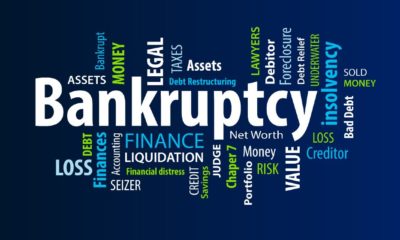Debt
How To Get Out of Debt Without Losing Time and Money

How To Get Out of Debt | I don't have to tell you that time is money. Compound interest is proof of that. When you're serious about getting out of debt, some gurus would have you get ‘gazelle-like' and use a snowball or avalanche to get out of debt.
While you live on beans and rice like no one else, it's ironically like all the third world countries, interest is being added to your debts. The experts won't put a time limit, but you should. Here's why.
RELATED: Avoiding Dumb Debt at All Costs
How To Get Out of Debt Without Losing Time and Money

Life moves by quickly. That's time. Financial goals need to be met like buying a car or a house or saving for retirement. The time you take to get out of debt slows down your ability to meet other goals.
The more money you spend getting out of debt slows down this process even further. What do you do when you're stressed out and backed into a corner?
You do everything you can to avoid the devastation of facing a possible bankruptcy because that would be the worst thing ever, right? Read on.
Choices are the cornerstone of the freedom we have in our country. That's great news that you actually have choices when it comes to getting out of debt.
First, we'll explore each option. Then, we'll look at the numbers using an example of what it would cost under each method. From there you can make a better choice of the option that is right for you.
A debt avalanche (also known as “debt stacking”) targets debts with the highest interest rates first. A debt snowball plan, in contrast, prioritizes your smallest debt first no matter the interest rate. Each time the smallest one is eliminated you move to the next smallest.
Alternately, consolidation is a new loan that rolls all the debt into the new loan. The average annual percentage rate (APR) on a consolidation loan is around 18.56%.
To put that into perspective, the average range of interest rates charged on consolidation loans typically falls between 8.31% and 28.81%.
Negotiating and settling debts for less than what is owed requires that you pay some of the debt and then pay taxes on the canceled debt.
The main problem with debt relief companies is the fact that they cannot stop lawsuits and it wreaks havoc on your credit report due to late and missed payments.
You can follow the gurus and use a snowball or avalanche method and repay your debts as you lose weight on beans and rice. Other options include consolidation and negotiated settlements, paying less than what you owe.
Paying less than you owe does come with a tax bill for the canceled. Each method has its pros and cons and affects credit availability.
All the while interest continues to accrue, your credit score drops as you fall further behind and you may even get sued. What if you could find a way to repay your debts with all of these benefits rolled into one? Let's look at the numbers.
Let's use the example of someone who has a total of $30,000.00 spread over two accounts and a student loan. In addition, you are able to set aside an extra $200 toward debt payments after making the minimum payments on all three accounts. 15000
- Credit Card A has a balance of $15,000, a starting minimum payment of $285, and an interest rate of 22.25%
- Credit Card B has a balance of $8,400, a starting minimum payment of $150, and an interest rate of $18.85%
- The student loan has a balance of $6,600, a monthly payment of $246, and an interest rate of 6.2%
- Avalanche will cost you $881 per month for 5 years paying a total of $44,528
- Snowball will cost you $936 per month for 4 years paying a total of $44,898
- Consolidation will cost you $552 per month for 10 years paying a total of $66,240
- The settlement will cost you $475 per month for 5 years paying a total of $28,500 including fees and taxes
- Chapter 13 will cost you $500 per month for 5 years paying a total of $35,000 including fees
Now that I've laid out the numbers, you can see that the least expensive ways to eliminate debt fall between negotiated debt settlement or a chapter 13 bankruptcy case payment plan.
Even though debt settlement appears cheaper than bankruptcy, if a lawsuit is filed, the program will typically remove that debt from their program and leave you hanging.
Also, if you're looking to preserve or improve your credit score, this program is not right for you because the debt relief agency won't make a payment on that debt until you have enough money in reserves for them to negotiate a lump sum settlement.
So, even though it appears to be the cheaper way, it may not be the best way based on ruined credit score, tax consequences and you may still wind up dealing with debts on your own if you're sued.
A 5-year payment plan in chapter 13 may be proposed to repay less than what you owe too, depending on the number of assets you own and your income. So, the total amount you owe could be even less.
Some of the benefits of chapter 13 include zero interest and no income tax consequences on the canceled debt. Even better is the improvement to the credit score because bankruptcy protection means that you can't be sued while paying debts through bankruptcy and since you're making payments, you should see your credit score improve while you're in repayment.
Now that I've laid out the numbers, you can see that the least expensive ways to eliminate debt fall between negotiated debt settlement or a chapter 13 bankruptcy case payment plan.
Even though debt settlement appears cheaper than bankruptcy, if a lawsuit is filed, the program will typically remove that debt from their program and leave you hanging.
Also, if you're looking to preserve or improve your credit score, this program is not right for you because the debt relief agency won't make a payment on that debt until you have enough money in reserves for them to negotiate a lump sum settlement.
So, even though it appears to be the cheaper way, it may not be the best way based on ruined credit score, tax consequences and you may still wind up dealing with debts on your own if you're sued.
About Christine A. Kingston
Consumer protection and bankruptcy lawyer of Surf City Lawyers representing families facing financial difficulties, burdened by debts including taxes, student loans, credit cards, medical bills, lawsuits, fallen behind on home mortgage payments, or facing auto loans they can no longer afford.
We stop wage garnishments and foreclosures dead in their tracks. The firm has helped clients eliminate $1.5 million in student loan debt and helped reduce principal mortgages through the bankruptcy process.
The law firm is passionate about helping clients achieve financial freedom from their debts and fights oppressive debt collectors.
Call us today to schedule your no-obligation consultation: 714-533-9210 or visit their website http://www.surfcitylawyers.com
Article Source: https://EzineArticles.com/expert/Christine_A._Kingston/479324
You Might Also Like:
- DeSantis Offers Antivax Police $5,000 to Relocate to Florida
- #ArrestFauci Trends On Twitter Over Animal Abuse Reports
- Immigrant Teen Jailed Locally for ICE Has Been Freed
Keep up to date with the latest finance news by following us on Facebook and Instagram.
Article Source: http://EzineArticles.com/












